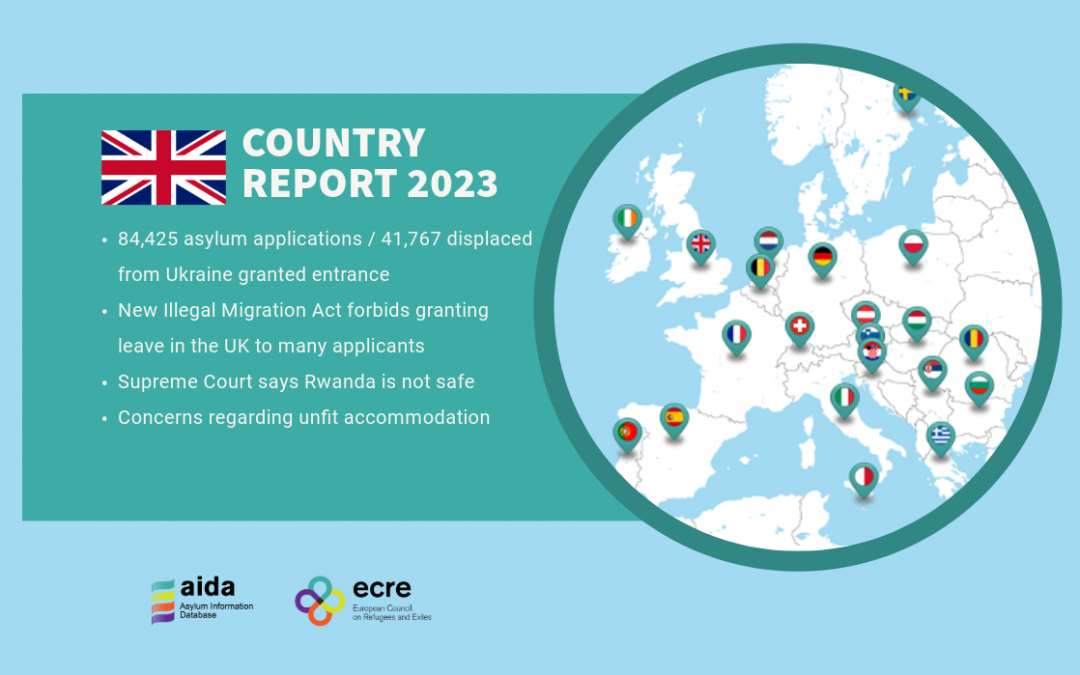The updated AIDA Country Report on the United Kingdom provides a detailed overview of legislative and practice-related developments in asylum procedures, reception conditions, detention of asylum seekers, content of international protection in 2023. It is accompanied by an annex detailing the visa support schemes that were adopted in response to displacement from Ukraine.
In 2023, 84,425 persons applied for asylum in the UK, a slight decrease from 89,398 in 2022. Crucially, the number of Albanian asylum seekers decreased sharply, from almost 16,000 in 2022 to less than 4,000 in 2023. The protection rate at first instance stood at 67% (compared to 74% in 2022) although it reached 99% and 86% for Afghan and Iranian nationals respectively. The number of pending cases significantly decreased from 132,182 at the end of 2022 to 95,252 at the end of 2023. In addition, the Home Office served 12,581 claimants with ‘notices of intent’ in 2023 (compared to 21,532 people in 2022) although only one inadmissibility decision was actually taken.
Almost 30,000 people arrived in the UK by crossing the Channel in small boats in 2023, a 36% decrease compared to 2022. This can be partly explained by a combination of overall worse weather and the drastic reduction in the number of Albanians who arrived by this route. In parallel, 2,904 people arrived in the UK through the Afghan Relocation and Assistance Policy in 2023. Regarding access to the asylum procedure, following an in-depth audit on the UK’s asylum intake, registration and screening procedures, the United Nations Refugee Agency (UNHCR) raised concerns regarding the use of informal barriers to asylum claims.
Following the significant changes that asylum legislative framework underwent in 2022, further changes were made in 2023 through the adoption of the Illegal Migration Act (IMA). Although most its provisions are not yet in force, they do apply to people who arrived in the UK on or after 7 March 2023, who entered the country unlawfully, who did not travel directly to the UK or who do not have permission to be there. For those people the relevant provisions of the IMA foresee that they ‘must not’ be given leave to remain in the UK, with limited exceptions. As a result of these new provisions and the lack of clarity regarding their application, there is an increasing backlog of cases.
Conversely, the two-tier system for refugees which was introduced by the 2022 Nationality and Borders Act and which penalised those people considered to have travelled through a safe third country and to have not claimed asylum without delay by giving them shorter leave and harder access to family reunion, was abandoned in 2023. As a result, people who had been affected had their leave changed to normal refugee leave.
Regarding the UK’s agreement with Rwanda, the Supreme Court found on 15 November 2023 that Rwanda could not be considered a safe country for asylum seekers, as there were substantial grounds for believing that people who were sent to Rwanda would be subject to refoulement and a real risk of ill treatment. To overcome this obstacle, the UK government brought forward legislation establishing that Rwanda was a safe country. The Safety of Rwanda (Asylum and Immigration) Act was approved by Parliament in April 2024.
In 2023, the UK authorities increased their use of institutional accommodation notably through repurposed military barracks and the Bibby Stockholm barge, all of which have been criticised as inadequate. Asylum seekers were temporarily evacuated from the barge following health concerns and an asylum seeker died in an apparent suicide on it in December 2023. The guidance issued in relation to the barge states that if people refuse to move onto it, their entire asylum support can be stopped, thus leaving them without financial support or accommodation.
In parallel, in response to the full-scale invasion of Ukraine in February 2022 and subsequent displacement, the UK initially introduced three support schemes. However, the Ukraine Family Scheme was closed without advance notice in February 2024. At the same time, conditions under the Homes for Ukraine Scheme were tightened so that sponsors had to be either British citizens or have permanent residence in the UK. In 2023, 70,908 people applied for entry into the UK under the Ukraine Family Scheme and the Homes for Ukraine Scheme (compared to almost 257,000 in 2022). Of those applicants, 41,767 were given permission to enter the UK and 42,000 actually entered the UK in 2023 (compared to 154,500 in 2022).
The full report is available here and the annex on the visa support schemes is available here.
For more information about the AIDA database or to read other AIDA reports, please visit the AIDA website.

